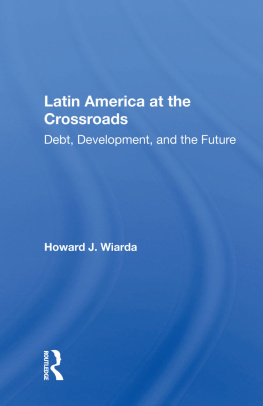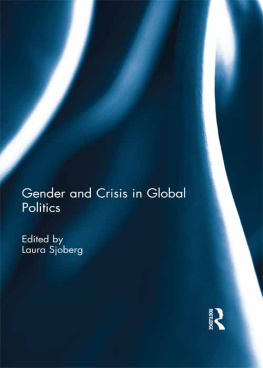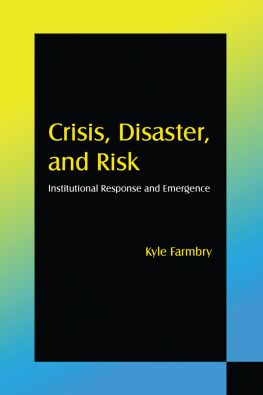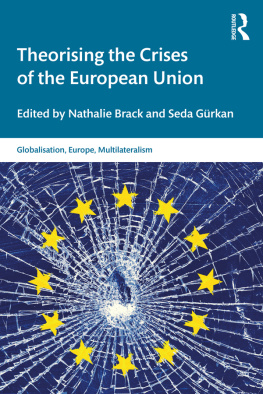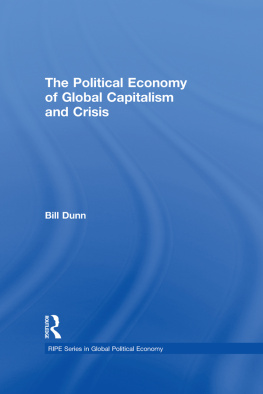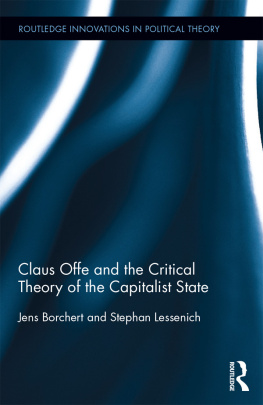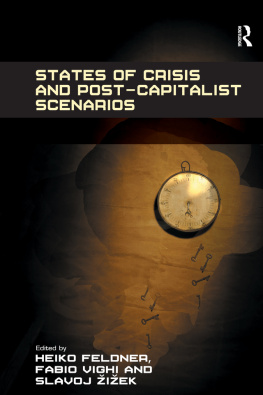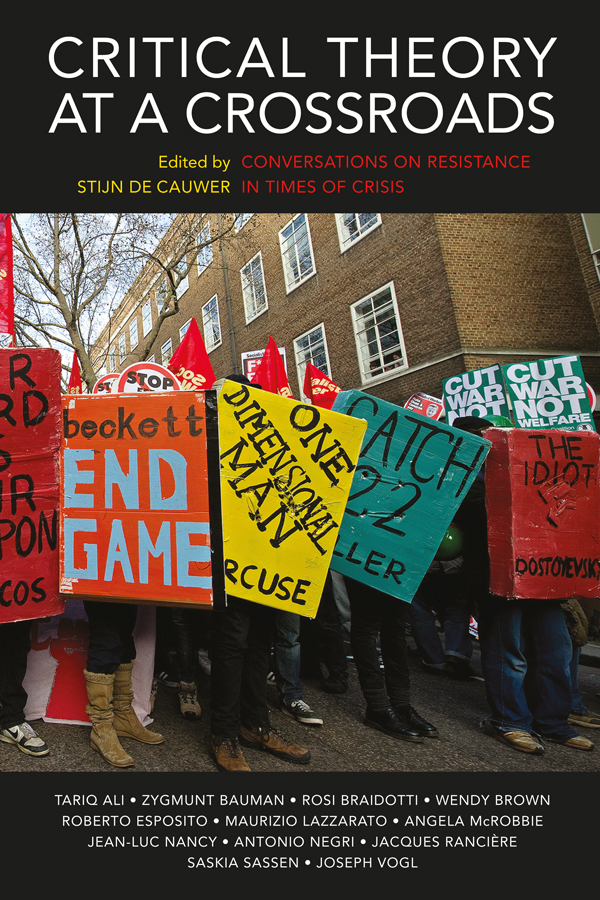Contents
Guide
Pagebreaks of the print version
Critical Theory at a Crossroads
Critical Theory at a Crossroads
Conversations on Resistance in Times of Crisis
EDITED BY
STIJN DE CAUWER

COLUMBIA UNIVERSITY PRESS
New York
Columbia University Press
Publishers Since 1893
New York Chichester, West Sussex
cup.columbia.edu
Copyright 2018 Columbia University Press
All rights reserved
E-ISBN 978-0-231-54683-6
Library of Congress Cataloging-in-Publication Data
Names: Cauwer, Stijn De, author.
Title: Critical theory at a crossroads : conversations on resistance in times of crisis / edited by Stijn De Cauwer.
Description: New York : Columbia University Press, 2018. | Includes bibliographical references and index.
Identifiers: LCCN 2018014924| ISBN 9780231186780 (cloth : alk. paper) | ISBN 9780231186797 (pbk. : alk. paper)
Subjects: LCSH: Critical theory. | Power (Social sciences)Europe. | Political participationEurope.
Classification: LCC HM480 .C743 2018 | DDC 303.3094dc23
LC record available at https://lccn.loc.gov/2018014924
A Columbia University Press E-book.
CUP would be pleased to hear about your reading experience with this e-book at .
Cover design: Milenda Nan Ok Lee
Cover photo: Leon Neal / Getty Images
Contents
Interview with Rosi Braidotti
Interview conducted and transcribed by Joost de Bloois
Interview with Jacques Rancire
Interview conducted and translated by Stijn De Cauwer and Gert-Jan Meyntjens
Interview with Joseph Vogl
Interview conducted and translated by Sven Fabr and Arne Vanraes
Interview with Wendy Brown
Interview conducted and transcribed by Joost de Bloois
Interview with Antonio Negri
Interview conducted and translated by Stijn De Cauwer and Gert-Jan Meyntjens
Interview with Tariq Ali
Interview conducted by Stijn De Cauwer
Interview with Saskia Sassen
Interview conducted by Tim Christiaens and Massimiliano Simons
Interview with Maurizio Lazzarato
Interview conducted by Tim Christiaens and Stijn De Cauwer. Translated by Tim Christiaens
Interview with Angela McRobbie
Interview conducted by Stijn De Cauwer, Gert-Jan Meyntjens, and Heidi Peeters
Interview with Jean-Luc Nancy
Interview conducted and translated by Erik Meganck and Evelien Van Beeck
Interview with Jean-Luc Nancy
Interview conducted and translated by Erik Meganck and Evelien Van Beeck
This book has come out of the activities of the interdisciplinary IdeaLab on the topic of biopolitics formed at the University of Leuven in Belgium in 2014 and funded by the Academische Stichting Leuven. Funding for this book and conducting the interviews has come from the Academische Stichting Leuven, the Department of Literary Studies and the Faculty of Philosophy of the University of Leuven, and the Research Foundation Flanders (FWO). I would like to thank the different interviewers and translators, Joost de Bloois, Tim Christiaens, Sven Fabr, Erik Meganck, Gert-Jan Meyntjens, Jolien Paeleman, Heidi Peeters, Massimiliano Simons, Evelien Van Beeck, and Arne Vanraes, as well as the different interviewees and other contributors, Tariq Ali, Zygmunt Bauman, Rosi Braidotti, Wendy Brown, Roberto Esposito, Maurizio Lazzarato, Angela McRobbie, Jean-Luc Nancy, Antonio Negri, Jacques Rancire, Saskia Sassen, and Joseph Vogl, for generously lending us their time and insights.
I also would like to thank Lydia Azadpour for correcting the first draft of this book and Sarah Warren for correcting later drafts of the book.
Furthermore, I would like to thank all the following people, in no particular order, who in one way or another were helpful in the making of this book: Bart Philipsen, Anneleen Masschelein, Judith Butler, Mia Hamels, Clarissa Colangelo, Mateusz Burzyk, Jonathan Sholl, Kim Hendrickx, Gert Meyers, Rudi Laermans, Daniel Blanga-Gubbay, Angela Mengoni, Jeroen Verbeeck, Jens De Vleminck, Michiel Rys, Sonja Lavaert, Juliana Barbi Almeida, Jeremy Bell, George Bruseker, Michael Jaworzyn, Nataliya Nesterova, Ena Gojak, Una Blagojevic, Matthias Somers, Jonas Rutgeerts, Laura Smith, Sjoerd van Tuinen, and Michele Fiorillo.
Finally, I would like to thank the editors of Columbia University Press, especially Wendy Lochner, Caroline Wazer, Lowell Frye, Marisa Lastres, and Robert Demke, for their assistance with the publication of this book, as well as the anonymous reviewers of the book for their suggestions.
This book is dedicated to the memory of my father, Boudewijn De Cauwer, who passed away on April 17, 2017.
STIJN DE CAUWER
In the past years, we have seen one crisis situation following another at a fast pace. Especially since the global financial crisis of 2008, the term crisis has never really disappeared from the headlines. We have seen the financial crisis, with housing bubbles and investment banks ruining themselves with toxic speculative mechanisms, requiring bailouts from the state. We have seen the ongoing crises of sovereign debt in different European countries accompanied by austerity regimes. In countries such as Greece, the standard of living has been reduced in a catastrophic way, shattering the idea that the European project is one of steadily growing prosperity. We have seen a never-ending and almost farcical series of summits and crisis meetings with hapless European leaders and diplomats, unable to make sound decisions or to overcome the lack of mutual solidarity between EU member states. We have seen the arrival of hundreds of thousands of refugees fleeing atrocious wars in Syria and elsewhere, causing identitarian anxieties and nationalist reflexes. A series of events, from the debt crisis to the Brexit referendum, has brought the European Union as a construction into an increasingly deepening crisis, to the point that its future is now questioned. The populations of different countries feel increasingly alienated and disenfranchised by the present political structures, expressing their disenchantment in an occasional referendum or by voting for grotesque, opportunist politicians. Terrorist attacks have been followed by the imposition of far-reaching security measures, lockdowns of cities, and poorly planned military actions. In the United States, the continuing police violence toward black citizens has caused widespread anger and indignation, with parts of the population expressing that the situation is insufferable and that they cannot breathe. As one crisis situation follows the next, the governing structures are often too indecisive, incompetent, or dysfunctional to cope with the magnitude of the problems they are facing, but nevertheless a series of exceptional measurescutbacks, border closures, travel restrictions, expanding the use of surveillance techniques, etc.is being imposed.
At the same time, the past years have seen the rise of a diverse series of new protest movements, as well as experiments in how to conceive political resistance. The havoc wreaked by the financial markets and investment banks caused people to occupy public squares and experiment with assemblies as a form of democracy in practice, which became the trademark of the Occupy movement. The disenfranchised youth of Spain gathered in 2011 on the Puerta del Sol in Madrid and other city squares to express their indignation about austerity measures, enormously high youth unemployment figures, and the extent to which the political structures in Spain were an extension of the banking and financial system that caused the crisis. The Indignados movement in Spain gradually changed from having an emphasis on practices of direct democracy and collective decision-making in assemblies into the political party Podemos, winning important political positions. In Greece, SYRIZA, an amalgam of smaller left-wing parties, was able to channel the anger about the austerity measures imposed on Greece by the European Union and the PASOK and New Democracy governments. Partly due to popular figures such as Alexis Tsipras or Iannis Varoufakis, SYRIZA was able to form a government and organize the much-discussed referendum in which the Greek population voted a resounding oxi to the austerity deal proposed by the delegates of the European Union. However, in an almost Shakespearian twist, the SYRIZA government decided to implement the proposed austerity measures anyway, causing a rift in the party and a decline in their popularity.


